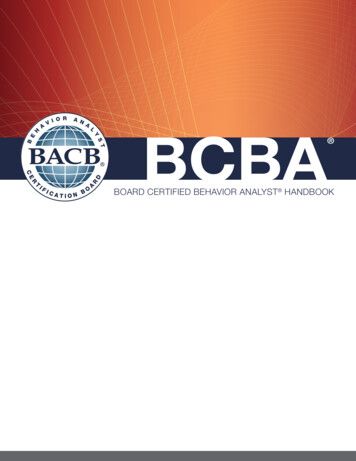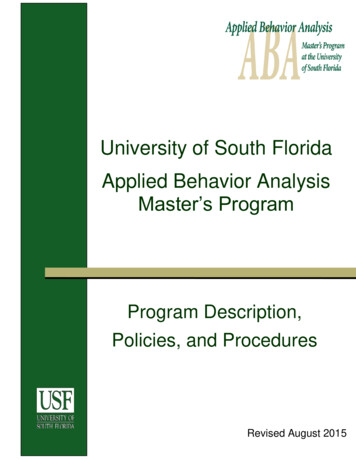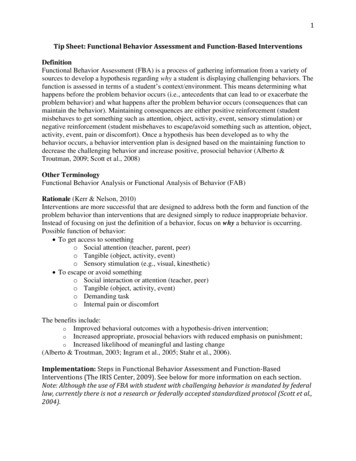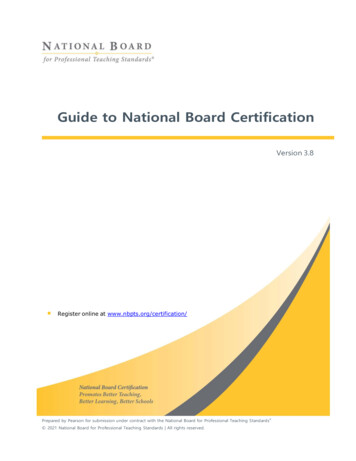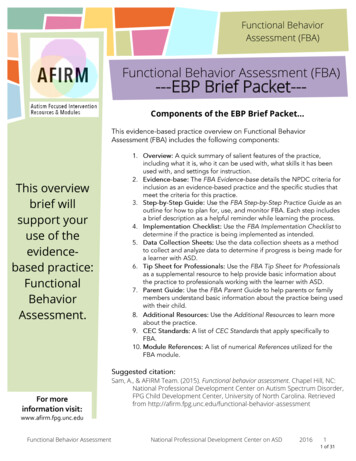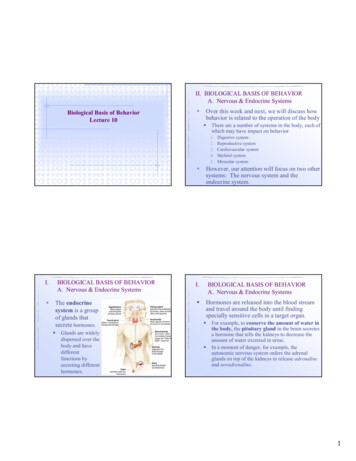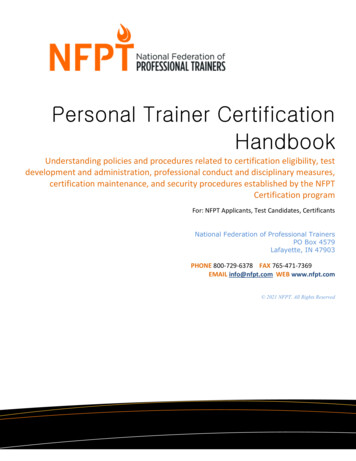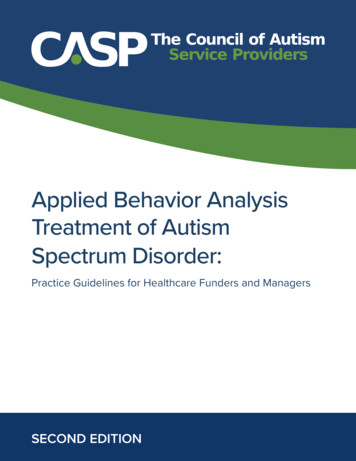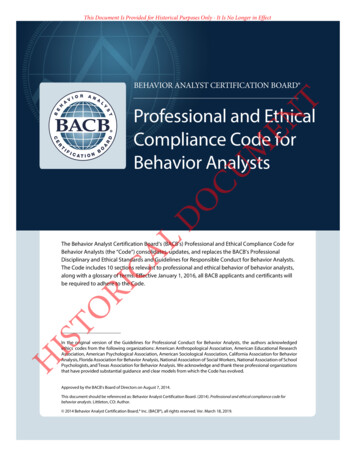
Transcription
This Document Is Provided for Historical Purposes Only - It Is No Longer in EffectBEHAVIOR ANALYST CERTIFICATION BOARD T ENLDOCU M Professional and EthicalCompliance Code forBehavior AnalystsISTORICAThe Behavior Analyst Certification Board’s (BACB’s) Professional and Ethical Compliance Code forBehavior Analysts (the “Code”) consolidates, updates, and replaces the BACB’s ProfessionalDisciplinary and Ethical Standards and Guidelines for Responsible Conduct for Behavior Analysts.The Code includes 10 sections relevant to professional and ethical behavior of behavior analysts,along with a glossary of terms. Effective January 1, 2016, all BACB applicants and certificants willbe required to adhere to the Code.HIn the original version of the Guidelines for Professional Conduct for Behavior Analysts, the authors acknowledgedethics codes from the following organizations: American Anthropological Association, American Educational ResearchAssociation, American Psychological Association, American Sociological Association, California Association for BehaviorAnalysis, Florida Association for Behavior Analysis, National Association of Social Workers, National Association of SchoolPsychologists, and Texas Association for Behavior Analysis. We acknowledge and thank these professional organizationsthat have provided substantial guidance and clear models from which the Code has evolved.Approved by the BACB’s Board of Directors on August 7, 2014.This document should be referenced as: Behavior Analyst Certification Board. (2014). Professional and ethical compliance code forbehavior analysts. Littleton, CO: Author. 2014 Behavior Analyst Certification Board, Inc. (BACB ), all rights reserved. Ver. March 18, 2019.
This Document Is Provided for Historical Purposes Only - It Is No Longer in Effect 1.011.021.031.041.051.061.07Reliance on Scientific KnowledgeBoundaries of CompetenceMaintaining Competence through Professional DevelopmentIntegrityProfessional and Scientific RelationshipsMultiple Relationships and Conflicts of InterestExploitative Relationships2.0Behavior Analysts’ Responsibility to 12.122.132.142.15Accepting ClientsResponsibilityConsultationThird-Party Involvement in ServicesRights and Prerogatives of ClientsMaintaining ConfidentialityMaintaining RecordsDisclosuresTreatment/Intervention EfficacyDocumenting Professional Work and ResearchRecords and DataContracts, Fees, and Financial ArrangementsAccuracy in Billing ReportsReferrals and FeesInterrupting or Discontinuing Services3.0Assessing Behavior3.013.023.033.043.05Behavior-Analytic AssessmentMedical ConsultationBehavior-Analytic Assessment ConsentExplaining Assessment ResultsConsent-Client Records4.0Behavior Analysts and the Behavior-Change 1Conceptual ConsistencyInvolving Clients in Planning and ConsentIndividualized Behavior-Change ProgramsApproving Behavior-Change ProgramsDescribing Behavior-Change Program ObjectivesDescribing Conditions for Behavior-Change Program SuccessEnvironmental Conditions that Interfere with ImplementationConsiderations Regarding Punishment ProceduresLeast Restrictive ProceduresAvoiding Harmful ReinforcersDiscontinuing Behavior-Change Programs and Behavior-AnalyticServicesMResponsible Conduct of Behavior AnalystsHISTORICALDOCU1.0ENTContents2
This Document Is Provided for Historical Purposes Only - It Is No Longer in Effect ENTContents, continuedBehavior Analysts as Supervisors5.015.025.035.045.055.065.07Supervisory CompetenceSupervisory VolumeSupervisory DelegationDesigning Effective Supervision and TrainingCommunication of Supervision ConditionsProviding Feedback to SuperviseesEvaluating the Effects of Supervision6.0Behavior Analysts’ Ethical Responsibility to the Profession of Behavior Analysts6.016.02Affirming PrinciplesDisseminating Behavior Analysis7.0Behavior Analysts’ Ethical Responsibility to Colleagues7.017.02Promoting an Ethical CultureEthical Violations by Others and Risk of Harm8.0Public Statements8.018.028.038.048.058.06Avoiding False or Deceptive StatementsIntellectual PropertyStatements by OthersMedia Presentations and Media-Based ServicesTestimonials and AdvertisingIn-Person Solicitation9.0Behavior Analysts and ming with Laws and RegulationsCharacteristics of Responsible ResearchInformed ConsentUsing Confidential Information for Didactic or Instructive PurposesDebriefingGrant and Journal ReviewsPlagiarismAcknowledging ContributionsAccuracy and Use of Data10.0Behavior Analysts’ Ethical Responsibility to the BACB10.0110.0210.0310.0410.0510.0610.07Truthful and Accurate Information Provided to the BACBTimely Responding, Reporting, and Updating of Information Provided to the BACBConfidentiality and BACB Intellectual PropertyExamination Honesty and IrregularitiesCompliance with BACB Supervision and Coursework StandardsBeing Familiar with This CodeDiscouraging Misrepresentation by Non-Certified IndividualsHISTORICALDOCUM5.03
This Document Is Provided for Historical Purposes Only - It Is No Longer in Effect 1.0Responsible Conduct of Behavior Analysts.1.01MBehavior analysts maintain the high standards of behavior of the profession.ENT Professional and Ethical Compliance Codefor Behavior AnalystsReliance on Scientific Knowledge.CUBehavior analysts rely on professionally derived knowledge based on science and behavior analysis whenmaking scientific or professional judgments in human service provision, or when engaging in scholarly or1.02Boundaries of Competence.Oprofessional endeavors.Maintaining Competence through Professional Development.RICA1.03LD(a) All behavior analysts provide services, teach, and conduct research only within the boundaries of theircompetence, defined as being commensurate with their education, training, and supervised experience.(b) Behavior analysts provide services, teach, or conduct research in new areas (e.g., populations,techniques, behaviors) only after first undertaking appropriate study, training, supervision, and/orconsultation from persons who are competent in those areas.Behavior analysts maintain knowledge of current scientific and professional information in their areasof practice and undertake ongoing efforts to maintain competence in the skills they use by reading theappropriate literature, attending conferences and conventions, participating in workshops, obtainingadditional coursework, and/or obtaining and maintaining appropriate professional credentials.Integrity.HISTO1.04(a) Behavior analysts are truthful and honest and arrange the environment to promote truthful and honestbehavior in others.(b) Behavior analysts do not implement contingencies that would cause others to engage in fraudulent,illegal, or unethical conduct.(c) Behavior analysts follow through on obligations, and contractual and professional commitments withhigh quality work and refrain from making professional commitments they cannot keep.(d) Behavior analysts’ behavior conforms to the legal and ethical codes of the social and professionalcommunity of which they are members. (See also, 10.02a Timely Responding, Reporting, and Updatingof Information Provided to the BACB)(e) If behavior analysts’ ethical responsibilities conflict with law or any policy of an organization withwhich they are affiliated, behavior analysts make known their commitment to this Code and take stepsto resolve the conflict in a responsible manner in accordance with law.4
This Document Is Provided for Historical Purposes Only - It Is No Longer in Effect Professional and Scientific Relationships.T1.051.06RICALDOCUMEN(a) Behavior analysts provide behavior-analytic services only in the context of a defined, professional,or scientific relationship or role.(b) When behavior analysts provide behavior-analytic services, they use language that is fullyunderstandable to the recipient of those services while remaining conceptually systematic withthe profession of behavior analysis. They provide appropriate information prior to service deliveryabout the nature of such services and appropriate information later about results and conclusions.(c) Where differences of age, gender, race, culture, ethnicity, national origin, religion, sexualorientation, disability, language, or socioeconomic status significantly affect behavior analysts’ workconcerning particular individuals or groups, behavior analysts obtain the training, experience,consultation, and/or supervision necessary to ensure the competence of their services, or they makeappropriate referrals.(d) In their work-related activities, behavior analysts do not engage in discrimination againstindividuals or groups based on age, gender, race, culture, ethnicity, national origin, religion, sexualorientation, disability, language, socioeconomic status, or any basis proscribed by law.(e) Behavior analysts do not knowingly engage in behavior that is harassing or demeaning to personswith whom they interact in their work based on factors such as those persons’ age, gender, race,culture, ethnicity, national origin, religion, sexual orientation, disability, language, or socioeconomicstatus, in accordance with law.(f) Behavior analysts recognize that their personal problems and conflicts may interfere with theireffectiveness. Behavior analysts refrain from providing services when their personal circumstancesmay compromise delivering services to the best of their abilities.Multiple Relationships and Conflicts of Interest.HISTO(a) Due to the potentially harmful effects of multiple relationships, behavior analysts avoid multiplerelationships.(b) Behavior analysts must always be sensitive to the potentially harmful effects of multiplerelationships. If behavior analysts find that, due to unforeseen factors, a multiple relationship hasarisen, they seek to resolve it.(c) Behavior analysts recognize and inform clients and supervisees about the potential harmful effectsof multiple relationships.(d) Behavior analysts do not accept any gifts from or give any gifts to clients because this constitutes amultiple relationship.1.07Exploitative Relationships.(a) Behavior analysts do not exploit persons over whom they have supervisory, evaluative, or otherauthority such as students, supervisees, employees, research participants, and clients.5
This Document Is Provided for Historical Purposes Only - It Is No Longer in Effect Behavior Analysts’ Responsibility to Clients.CU2.0MENT(b) Behavior analysts do not engage in sexual relationships with clients, students, or supervisees,because such relationships easily impair judgment or become exploitative.(c) Behavior analysts refrain from any sexual relationships with clients, students, or supervisees, for atleast two years after the date the professional relationship has formally ended.(d) Behavior analysts do not barter for services, unless a written agreement is in place for the barter thatis (1) requested by the client or supervisee; (2) customary to the area where services are provided;and (3) fair and commensurate with the value of behavior-analytic services provided.2.01Accepting Clients.DOBehavior analysts have a responsibility to operate in the best interest of clients. The term client as usedhere is broadly applicable to whomever behavior analysts provide services, whether an individualperson (service recipient), a parent or guardian of a service recipient, an organizational representative, apublic or private organization, a firm, or a corporation.2.02RICALBehavior analysts accept as clients only those individuals or entities whose requested services arecommensurate with the behavior analysts’ education, training, experience, available resources,and organizational policies. In lieu of these conditions, behavior analysts must function under thesupervision of or in consultation with a behavior analyst whose credentials permit performing suchservices.Responsibility.ISTOBehavior analysts’ responsibility is to all parties affected by behavior-analytic services. When multipleparties are involved and could be defined as a client, a hierarchy of parties must be established andcommunicated from the outset of the defined relationship. Behavior analysts identify andcommunicate who the primary ultimate beneficiary of services is in any given situation and advocatefor his or her best interests.H2.03Consultation.(a) Behavior analysts arrange for appropriate consultations and referrals based principally on the bestinterests of their clients, with appropriate consent, and subject to other relevant considerations,including applicable law and contractual obligations.(b) When indicated and professionally appropriate, behavior analysts cooperate with otherprofessionals, in a manner that is consistent with the philosophical assumptions and principles ofbehavior analysis, in order to effectively and appropriately serve their clients.6
This Document Is Provided for Historical Purposes Only - It Is No Longer in Effect Third-Party Involvement in Services.T2.042.05RICALDOCUMEN(a) When behavior analysts agree to provide services to a person or entity at the request of a thirdparty, behavior analysts clarify, to the extent feasible and at the outset of the service, the nature ofthe relationship with each party and any potential conflicts. This clarification includes the role ofthe behavior analyst (such as therapist, organizational consultant, or expert witness), the probableuses of the services provided or the information obtained, and the fact that there may be limits toconfidentiality.(b) If there is a foreseeable risk of behavior analysts being called upon to perform conflicting rolesbecause of the involvement of a third party, behavior analysts clarify the nature and direction oftheir responsibilities, keep all parties appropriately informed as matters develop, and resolve thesituation in accordance with this Code.(c) When providing services to a minor or individual who is a member of a protected population at therequest of a third party, behavior analysts ensure that the parent or client-surrogate of the ultimaterecipient of services is informed of the nature and scope of services to be provided, as well as theirright to all service records and data.(d) Behavior analysts put the client’s care above all others and, should the third party makerequirements for services that are contraindicated by the behavior analyst’s recommendations,behavior analysts are obligated to resolve such conflicts in the best interest of the client. If saidconflict cannot be resolved, that behavior analyst’s services to the client may be discontinuedfollowing appropriate transition.Rights and Prerogatives of Clients.HISTO(a) The rights of the client are paramount and behavior analysts support clients’ legal rights andprerogatives.(b) Clients and supervisees must be provided, on request, an accurate and current set of the behavioranalyst’s credentials.(c) Permission for electronic recording of interviews and service delivery sessions is secured fromclients and relevant staff in all relevant settings. Consent for different uses must be obtainedspecifically and separately.(d) Clients and supervisees must be informed of their rights and about procedures to lodge complaintsabout professional practices of behavior analysts with the employer, appropriate authorities, and theBACB.(e) Behavior analysts comply with any requirements for criminal background checks.2.06Maintaining Confidentiality.(a) Behavior analysts have a primary obligation and take reasonable precautions to protect theconfidentiality of those with whom they work or consult, recognizing that confidentiality may beestablished by law, organizational rules, or professional or scientific relationships.7
This Document Is Provided for Historical Purposes Only - It Is No Longer in Effect Maintaining Records.O2.07CUMENT(b) Behavior analysts discuss confidentiality at the outset of the relationship and thereafter as newcircumstances may warrant.(c) In order to minimize intrusions on privacy, behavior analysts include only information germaneto the purpose for which the communication is made in written, oral, and electronic reports,consultations, and other avenues.(d) Behavior analysts discuss confidential information obtained in clinical or consulting relationships,or evaluative data concerning clients, students, research participants, supervisees, and employees,only for appropriate scientific or professional purposes and only with persons clearly concernedwith such matters.(e) Behavior analysts must not share or create situations likely to result in the sharing of any identifyinginformation (written, photographic, or video) about current clients and supervisees within socialmedia contexts.2.08RICALD(a) Behavior analysts maintain appropriate confidentiality in creating, storing, accessing, transferring,and disposing of records under their control, whether these are written, automated, electronic, or inany other medium.(b) Behavior analysts maintain and dispose of records in accordance with applicable laws, regulations,corporate policies, and organizational policies, and in a manner that permits compliance with therequirements of this Code.Disclosures.ISTOBehavior analysts never disclose confidential information without the consent of the client, exceptas mandated by law, or where permitted by law for a valid purpose, such as (1) to provide neededprofessional services to the client, (2) to obtain appropriate professional consultations, (3) to protectthe client or others from harm, or (4) to obtain payment for services, in which instance disclosure islimited to the minimum that is necessary to achieve the purpose. Behavior analysts recognize thatparameters of consent for disclosure should be acquired at the outset of any defined relationship and isan ongoing procedure throughout the duration of the professional relationship.H2.09Treatment/Intervention Efficacy.(a) Clients have a right to effective treatment (i.e., based on the research literature and adapted to theindividual client). Behavior analysts always have the obligation to advocate for and educate theclient about scientifically supported, most-effective treatment procedures. Effective treatmentprocedures have been validated as having both long-term and short-term benefits to clients andsociety.(b) Behavior analysts have the responsibility to advocate for the appropriate amount and level of8
This Document Is Provided for Historical Purposes Only - It Is No Longer in Effect Documenting Professional Work and Research.CU2.10MENTservice provision and oversight required to meet the defined behavior-change program goals.(c) In those instances where more than one scientifically supported treatment has been established,additional factors may be considered in selecting interventions, including, but not limited to,efficiency and cost-effectiveness, risks and side-effects of the interventions, client preference, andpractitioner experience and training.(d) Behavior analysts review and appraise the effects of any treatments about which they are aware thatmight impact the goals of the behavior-change program, and their possible impact on the behaviorchange program, to the extent possible.2.11Records and Data.DO(a) Behavior analysts appropriately document their professional work in order to facilitate provisionof services later by them or by other professionals, to ensure accountability, and to meet otherrequirements of organizations or the law.(b) Behavior analysts have a responsibility to create and maintain documentation in the kind of detailand quality that would be consistent with best practices and the law.2.12RICAL(a) Behavior analysts create, maintain, disseminate, store, retain, and dispose of records and datarelating to their research, practice, and other work in accordance with applicable laws, regulations,and policies; in a manner that permits compliance with the requirements of this Code; and in amanner that allows for appropriate transition of service oversight at any moment in time.(b) Behavior analysts must retain records and data for at least seven (7) years and as otherwise requiredby law.Contracts, Fees, and Financial Arrangements.HISTO(a) Prior to the implementation of services, behavior analysts ensure that there is in place a signedcontract outlining the responsibilities of all parties, the scope of behavior-analytic services to beprovided, and behavior analysts’ obligations under this Code.(b) As early as is feasible in a professional or scientific relationship, behavior analysts reach anagreement with their clients specifying compensation and billing arrangements.(c) Behavior analysts’ fee practices are consistent with law and behavior analysts do not misrepresenttheir fees. If limitations to services can be anticipated because of limitations in funding, this isdiscussed with the client as early as is feasible.(d) When funding circumstances change, the financial responsibilities and limits must be revisited withthe client.9
This Document Is Provided for Historical Purposes Only - It Is No Longer in Effect Accuracy in Billing Reports.T2.132.14ENBehavior analysts accurately state the nature of the services provided, the fees or charges, the identity ofthe provider, relevant outcomes, and other required descriptive data.Referrals and Fees.2.15Interrupting or Discontinuing Services.CUMBehavior analysts must not receive or provide money, gifts, or other enticements for any professionalreferrals. Referrals should include multiple options and be made based on objective determinationof the client need and subsequent alignment with the repertoire of the referee. When providing orreceiving a referral, the extent of any relationship between the two parties is disclosed to the client.ISTORICALDO(a) Behavior analysts act in the best interests of the client and supervisee to avoid interruption ordisruption of service.(b) Behavior analysts make reasonable and timely efforts for facilitating the continuation of behavioranalytic services in the event of unplanned interruptions (e.g., due to illness, impairment,unavailability, relocation, disruption of funding, disaster).(c) When entering into employment or contractual relationships, behavior analysts provide for orderlyand appropriate resolution of responsibility for services in the event that the employment orcontractual relationship ends, with paramount consideration given to the welfare of the ultimatebeneficiary of services.(d) Discontinuation only occurs after efforts to transition have been made. Behavior analystsdiscontinue a professional relationship in a timely manner when the client: (1) no longer needs theservice, (2) is not benefiting from the service, (3) is being harmed by continued service, or (4) whenthe client requests discontinuation. (See also, 4.11 Discontinuing Behavior-Change Programs andBehavior-Analytic Services)(e) Behavior analysts do not abandon clients and supervisees. Prior to discontinuation, for whateverreason, behavior analysts: discuss service needs, provide appropriate pre-termination services,suggest alternative service providers as appropriate, and, upon consent, take other reasonable stepsto facilitate timely transfer of responsibility to another provider.H3.0 Assessing Behavior.Behavior analysts using behavior-analytic assessment techniques do so for purposes that areappropriate given current research.10
This Document Is Provided for Historical Purposes Only - It Is No Longer in Effect T3.01 Behavior-Analytic Assessment.CUMEN(a) Behavior analysts conduct current assessments prior to making recommendations or developingbehavior-change programs. The type of assessment used is determined by client’s needs and consent,environmental parameters, and other contextual variables. When behavior analysts are developing abehavior-reduction program, they must first conduct a functional assessment.(b) Behavior analysts have an obligation to collect and graphically display data, using behavior-analyticconventions, in a manner that allows for decisions and recommendations for behavior-changeprogram development.3.02 Medical Consultation.OBehavior analysts recommend seeking a medical consultation if there is any reasonable possibility that areferred behavior is influenced by medical or biological variables.3.03 Behavior-Analytic Assessment Consent.LD(a) Prior to conducting an assessment, behavior analysts must explain to the client the procedure(s) tobe used, who will participate, and how the resulting information will be used.(b) Behavior analysts must obtain the client’s written approval of the assessment procedures beforeimplementing them.RICA3.04 Explaining Assessment Results.Behavior analysts explain assessment results using language and graphic displays of data that arereasonably understandable to the client.3.05Consent-Client Records.ISTOBehavior analysts obtain the written consent of the client before obtaining or disclosing client recordsfrom or to other sources, for assessment purposes.H4.0Behavior Analysts and the Behavior-ChangeProgram.Behavior analysts are responsible for all aspects of the behavior-change program from conceptualizationto implementation and ultimately to discontinuation.11
This Document Is Provided for Historical Purposes Only - It Is No Longer in Effect Conceptual Consistency.T4.014.02Involving Clients in Planning and Consent.ENBehavior analysts design behavior-change programs that are conceptually consistent with behavioranalytic principles.4.03Individualized Behavior-Change Programs.MBehavior analysts involve the client in the planning of and consent for behavior-change programs.Approving Behavior-Change Programs.O4.04CU(a) Behavior analysts must tailor behavior-change programs to the unique behaviors, environmentalvariables, assessment results, and goals of each client.(b) Behavior analysts do not plagiarize other professionals’ behavior-change programs.Describing Behavior-Change Program Objectives.L4.05DBehavior analysts must obtain the client’s written approval of the behavior-change program beforeimplementation or making significant modifications (e.g., change in goals, use of new procedures).4.06RICABehavior analysts describe, in writing, the objectives of the behavior-change program to the clientbefore attempting to implement the program. To the extent possible, a risk-benefit analysis should beconducted on the procedures to be implemented to reach the objective. The description of programobjectives and the means by which they will be accomplished is an ongoing process throughout theduration of the client-practitioner relationship.Describing Conditions for Behavior-Change Program Success.ISTOBehavior analysts describe to the client the environmental conditions that are necessary for thebehavior-change program to be effective.H4.07Environmental Conditions that Interfere with Implementation.(a) If environmental conditions prevent implementation of a behavior-change program, behavioranalysts recommend that other professional assistance (e.g., assessment, consultation or therapeuticintervention by other professionals) be sought.(b) If environmental conditions hinder implementation of the behavior-change program, behavioranalysts seek to eliminate the environmental constraints, or identify in writing the obstacles todoing so.12
This Document Is Provided for Historical Purposes Only - It Is No Longer in Effect Considerations Regarding Punishment Procedures.T4.08Least Restrictive Procedures.O4.09CUMEN(a) Behavior analysts recommend reinforcement rather than punishment whenever possible.(b) If punishment procedures are necessary, behavior analysts always include reinforcement proceduresfor alternative behavior in the behavior-change program.(c) Before implementing punishment-based procedures, behavior analysts ensure that appropriatesteps have been taken to implement reinforcement-based procedures unless the severity ordangerousness of the behavior necessitates immediate use of aversive procedures.(d) Behavior analysts ensure that aversive procedures are accompanied by an increased level of training,supervision, and oversight. Behavior analysts must evaluate the effectiveness of aversive proceduresin a timely manner and modify the behavior-change program if it is ineffective. Behavior analystsalways include a plan to discontinue the use of aversive procedures when no longer needed.4.10DBehavior analysts review and appraise the restrictiveness of procedures and always recommend theleast restrictive procedures likely to be effective.Avoiding Harmful Reinforcers.LBehavior analysts minimize the use of items as potential reinforcers that may be harmful to the health4.11RICAand development of the client, or that may require excessive motivating operations to be effective.Discontinuing Behavior-Change Programs and Behavior-Analytic Services.ISTO(a) Behavior analysts establish understandable and objective (i.e., measurable) criteria for thediscontinuation of the behavior change program and describe them to the client. (See also, 2.15dInterrupting or Discontinuing Services)(b) Behavior analysts discontinue services with the client when the established criteria fordiscontinuation are attained, as in when a series of agreed-upon goals have been met. (See also,2.15d Interrupting or Discontinuing Services)H5.0Behavior Analysts as Supervisors.When behavior analysts are functioning as supervisors, they must take full responsibility for all facetsof this undertaking. (See also, 1.06 Multiple Relationships and Conflict of Interest, 1.07 ExploitativeRelationships, 2.05 Rights and Prerogatives of Clients, 2.06 Maintaining Confidentiality, 2.15Interrupting or Discontinuing Services, 8.04 Media Presentations and Media-Based Services, 9.02Characteristics of Responsible Research, 10.05 Compliance with BACB Supervision and CourseworkStandards)13
This
Behavior analysts maintain the high standards of behavior of the profession. 1.01 Reliance on Scientific Knowledge. Behavior analysts rely on professionally derived knowledge based on science and behavior analysis when making scientific or professional judgments in human service provision,
